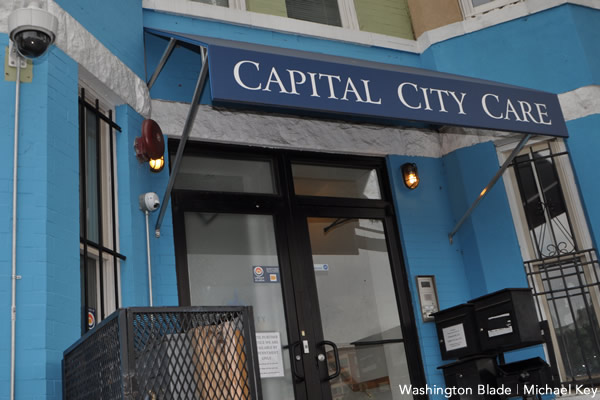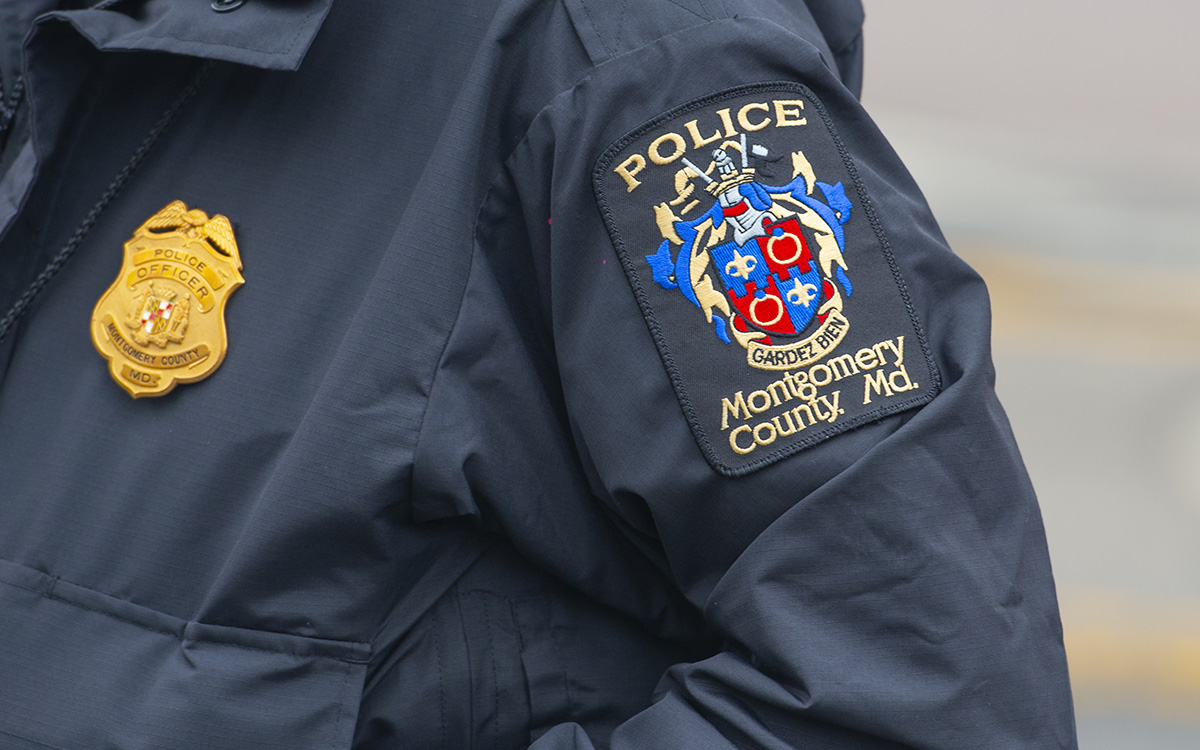Local
First D.C. medical marijuana dispensaries open
AIDS activists hail development; cautious reaction from federal prosecutor


Capital City Care sold its first doctor-approved dose of medical marijuana to an HIV-positive man on July 29. (Washington Blade photo by Michael Key)
Advocates for people with AIDS and other serious illnesses breathed a sigh of relief three weeks ago when the first of three dispensaries approved by the D.C. Department of Health to sell medical marijuana opened its doors about a mile north of the U.S. Capitol.
Capital City Care, located in a converted townhouse at 1334 North Capitol St., N.W., sold its first doctor-approved dose of high-grade cannabis to an HIV-positive man on July 29, 15 years after D.C. voters approved a 1998 ballot initiative to legalize medical marijuana in the nation’s capital.
Medical marijuana advocates in D.C. said initial concerns that dispensaries could only accept payments in cash for a typical purchase of $250 or more and that the dispensaries would be located in unsafe neighborhoods, subjecting buyers to potential muggings, were largely unfounded.
Although the cultivation centers where the marijuana will be grown are in remote warehouse sections of Northeast D.C., most of the dispensaries are expected to open in safe neighborhoods, according to Ben Young, chief of staff for D.C. Council member David Catania (I-At-Large), who wrote the implementing legislation for the medical marijuana law.
One of the other two dispensaries that have so far been approved for a license, Takoma Park Wellness Center, recently opened in the city’s Takoma Park neighborhood at 6925 Blair Rd., N.W. The other one, Metropolitan Wellness Center, just opened near the Eastern Market Metro station on Capitol Hill at 409 8th St., S.E.
And officials with Capital City Care say they will soon provide a shuttle service to drive patients to and from central locations downtown or to a nearby Metro station. The officials also note that payment for marijuana supplies can be made by bank debit cards, although banks won’t allow patients to pay by credit card or check.
D.C.’s medical marijuana law encountered the first in a series of roadblocks shortly after the 1998 ballot measure passed with nearly 70 percent of the votes cast when Congress intervened by preventing the law from being implemented for more than a decade. When Congress finally lifted its hold on the law in 2009, the City Council and D.C. Department of Health began a laborious process of developing strict rules and procedures for licensing and approving cultivation centers and the dispensaries.
“It’s really gratifying that this 15-year journey has moved to where we are now,” said D.C. attorney Wayne Turner, who, in his role as a gay rights and AIDS activist, was among the leaders of the campaign in support of the 1998 ballot initiative.
“We still have Congress looming over our head,” he said. “And we have an administration that is not that supportive.”

(Photo courtesy of Capital City Care)
With that as a backdrop, both AIDS activists and D.C. government officials have said the additional four years it has taken to get the medical marijuana program up and running appears to have helped the city avoid some of the pitfalls encountered by medical marijuana programs in other states, such as California and Colorado.
Among the problems encountered by states that legalized medical marijuana in the past were threats by federal law enforcement officials to shut down the cultivation centers and dispensaries and arrest the people operating them by invoking federal drug laws under which marijuana remains illegal.
Federal law enforcement officials have backed down from those threats following strong objections raised by elected officials in the states that have legalized medical marijuana. But with the sale of marijuana for medical purposes set to begin in D.C., banks and credit card companies informed the Capital City Care dispensary that they would not approve payment for marijuana by credit card or check.
“They said the reason is the banks may not be able to file suit and go after someone for a bad debt if the sale is not legal under federal law,” said Patricia Hawkins, an official with the D.C. Community AIDS Network, which is partnering with Capital City Care to provide counseling services for its marijuana clients.
Hawkins, the former deputy director of the then Whitman-Walker Clinic, said banks have agreed to allow Capital City Care and other dispensaries expected to open soon to accept payment by bank debit cards, giving patients the option of paying by debit card or cash.
Meanwhile, spokespersons for the U.S. Department of Justice and the Office of the U.S. Attorney for D.C. told the Blade in separate statements that they don’t expect to go after the city’s medical marijuana dispensaries or cultivation centers for violating federal drug laws.
“The Department of Justice has advised U.S. Attorneys that prosecution of significant drug traffickers, including marijuana, remains a core priority of the Department, but that focusing enforcement efforts on individuals with cancer and other serious illnesses who use marijuana as part of a recommended treatment regimen likely is not an efficient use of federal resources,” DOJ spokesperson Allison Price told the Blade in an email.
Matthew Jones, a spokesperson for Ronald Machen Jr., the U.S. Attorney for D.C. who serves as the city’s chief prosecutor, released a similar statement to the Blade.
“With respect to medical marijuana, the U.S. Attorney’s Office for the District of Columbia will abide by the Justice Department guidance issued to prosecutors that it is not an efficient use of resources to focus enforcement efforts on individual patients with cancer or other serious illnesses, or on individual caregivers who are not engaged in the commercial cultivation, sale, or distribution of marijuana,” Jones said.
Scott Morgan, a spokesperson for Capital City Care, said that under rules established by the D.C. DOH anyone seeking to buy marijuana under the city’s medical marijuana program must meet three requirements. They must have been diagnosed with at least one of several specified illnesses or conditions, including HIV/AIDS, cancer, MS, and glaucoma.
Next, they must be approved for marijuana treatment by a doctor licensed to practice in D.C. and who has been approved by the DOH to refer patients for marijuana treatment. And finally, the patient must be a D.C. resident.
A price list available on the Capital City Care website shows that a variety of strains of marijuana are available but all sell for $380 or more for an ounce. Patients can buy smaller quantities for as low as $20 for a gram.
Although the cost of marijuana on the street through the black market is about the same or possibly a little less, medical marijuana advocates such as Turner caution patients against buying their supplies on the street.
“You don’t know what you’re getting on the street,” Turner said. “Some impurities are mold and mildew. And that is harmful to people with an impaired immune system.”
Morgan said Capital City Care’s cultivation center is operated like a pharmaceutical factory where strict standards of cleanliness and organic growing conditions are employed to ensure that the marijuana is pure and free of contaminants.
Maryland
Montgomery County police chief discloses details behind arrest of 18-year-old trans student charged with plans to commit school shooting
County executive tells news conference student’s trans identity is irrelevant to criminal charge

Montgomery County, Md., Police Chief Marcus Jones joined other county and law enforcement officials at a news conference on Friday, April 19, to provide details of the police investigation and arrest of an 18-year-old high school student charged two days earlier with threats of mass violence based on information that he allegedly planed a mass shooting at the high school and elementary school he attended in Rockville, Md.
In charging documents and in a press released issued on April 18, Montgomery County Police identified the arrested student as “Andrea Ye, of Rockville, whose preferred name is Alex Ye.”
One of the charging documents states that a friend of Ye, who police say came forward as a witness who played a crucial role in alerting authorities to Ye’s threats of a school shooting, noted that Ye told the witness that Ye identified as the transgender student he wrote about as a character in a 129-page manifesto outlining plans for a school shooting. Police have said Ye told them the manifesto was a fictional story he planned to publish.
At the news conference on Friday, Police Chief Jones and other law enforcement officials, including an FBI official and Montgomery County Executive Marc Elrich, referred to the student as Alex Ye and Mr. Ye. None of the officials raised the issue of whether Ye identified as a transgender man, seven though one of the police documents identifies Ye as a “biological female.”
County Executive Elrich appeared to express the views of the public officials at the news conference when one of the media reporters, during a question-and-answer period, asked Elrich why he and the others who spoke at the news conferment failed to “admit that this individual was transgender.”
“Because it’s not a lead,” Elrich replied, asking if the press and law enforcement authorities should disclose that someone arrested for murder is “a white Christian male who’s heterosexual.” Elrich stated, “No, you don’t – You never publish somebody’s sexual orientation when we talk about this. Why you are focusing on this being a transgender is beyond me. It’s not a news story. It is not a crime to be transgender.”
The reporter attempted to respond but was cut off by the press conference moderator, who called on someone else to ask the next question.
In his remarks at the press conference Chief Jones praised the so far unidentified witness who was the first to alert authorities about Ye’s manifesto appearing to make threats of a mass school shooting.
“Now, this is a situation that highlights the critical importance of vigilance and community involvement in preventing potential tragedies,” Jones said. “I commend the collaborative efforts of the Montgomery County Police Department, the Federal Bureau of Investigation, the Rockville City Police Department, and the Montgomery County Public Schools, as well as Montgomery County Health and Human Services,” he told the gathering.
“Thanks to their swift action and cooperation a potentially catastrophic event was prevented,” Jones said.
Jones pointed out that during the current school year, police have received reports of 140 threats to the public schools in Montgomery County. He said after a thorough investigation, none of them rose to the level where an arrest was made. Instead, police and school officials took steps to arrange for the student making the threats and their parents to take remedial action, including providing mental health services.
“But this case is different,” Jones said. “This case is entirely different that takes it to a different level. It was a concerned witness who brought this matter to light by rereporting the suspect’s manifesto to the authorities. This underscores the value of community engagement and the ‘see something say something’ approach,” he said.
Jones mentioned at the press conference that Ye was being held without bond since the time of his arrest but was scheduled to appear in court for a bond hearing on Friday shortly after the press conference took place to determine whether he should be released while awaiting trial or continue to be held.
In his manifesto obtained by police, Ye writes about committing a school shooting, and strategizes how to carry out the act. Ye also contemplates targeting an elementary school and says that he wants to be famous.
In charging documents reported on by WJLA 7 and WBAL 11, the 129-page document, which Ye has referred to as a book of fiction, included writings that said, in part:
“I want to shoot up a school. I’ve been preparing for months. The gun is an AR-15. This gun is going to change lives tomorrow … As I walk through the hallways, I cherry pick the classrooms that are the easiest targets. I need to figure out how to sneak the gun in. I have contemplated making bombs. The instructions to make them are surprisingly available online. I have also considered shooting up my former elementary school because little kids make easier targets. High school’s the best target; I’m the most familiar with the layout. I pace around my room like an evil mastermind. I’ve put so much effort into this. My ultimate goal would be to set the world record for the most amount of kills in a shooting. If I have time, I’ll try to decapitate my victims with a knife to turn the injuries into deaths.”
Maryland
Rockville teen charged with plotting school shooting after FBI finds ‘manifesto’
Alex Ye charged with threats of mass violence

BY BRETT BARROUQUERE | A Montgomery County high school student is charged with what police describe as plans to commit a school shooting.
Andrea Ye, 18, of Rockville, whose preferred name is Alex Ye, is charged with threats of mass violence. Montgomery County Police and the FBI arrested Ye Wednesday.
The rest of this article can be found on the Baltimore Banner’s website.
District of Columbia
New D.C. LGBTQ+ bar Crush set to open April 19
An ‘all-inclusive entertainment haven,’ with dance floor, roof deck

D.C.’s newest LGBTQ+ bar called Crush is scheduled to open for business at 4 p.m. on Friday, April 19, in a spacious, two-story building with a dance floor and roof deck at 2007 14th St., N.W. in one of the city’s bustling nightlife areas.
A statement released by co-owners Stephen Rutgers and Mark Rutstein earlier this year says the new bar will provide an atmosphere that blends “nostalgia with contemporary nightlife” in a building that was home to a popular music store and radio supply shop.
Rutgers said the opening comes one day after Crush received final approval of its liquor license that was transferred from the Owl Room, a bar that operated in the same building before closing Dec. 31 of last year. The official opening also comes three days after Crush hosted a pre-opening reception for family, friends, and community members on Tuesday, April 16.
Among those attending, Rutgers said, were officials with several prominent local LGBTQ organizations, including officials with the DC Center for the LGBTQ Community, which is located across the street from Crush in the city’s Reeves Center municipal building. Also attending were Japer Bowles, director of the Mayor’s Office of LGBTQ Affairs, and Salah Czapary, director of the Mayor’s Office of Nightlife and Culture.
Rutgers said Crush plans to hold a grand opening event in a few weeks after he, Rutstein and the bar’s employees become settled into their newly opened operations.
“Step into a venue where inclusivity isn’t just a promise but a vibrant reality,” a statement posted on the Crush website says. “Imagine an all-inclusive entertainment haven where diversity isn’t just celebrated, it’s embraced as the very heartbeat of our venue,” the statement says. “Welcome to a place where love knows no bounds, and the only color or preference that matters is the vibrant tapestry of humanity itself. Welcome to Crush.”
The website says Crush will be open Tuesdays and Wednesdays from 4 p.m. to 12 a.m., Thursdays from 4 p.m. to 2 a.m., Fridays from 4 p.m. to 3 a.m., Saturdays from 2 p.m. to 3 a.m., and Sundays from 2 p.m. to 12 a.m. It will be closed on Mondays.
Crush is located less than two blocks from the U Street Metro station.
-

 Africa5 days ago
Africa5 days agoCongolese lawmaker introduces anti-homosexuality bill
-

 District of Columbia1 day ago
District of Columbia1 day agoReenactment of first gay rights picket at White House draws interest of tourists
-

 World5 days ago
World5 days agoOut in the World: LGBTQ news from Europe and Asia
-

 Arizona1 day ago
Arizona1 day agoAriz. governor vetoes anti-transgender, Ten Commandments bill










